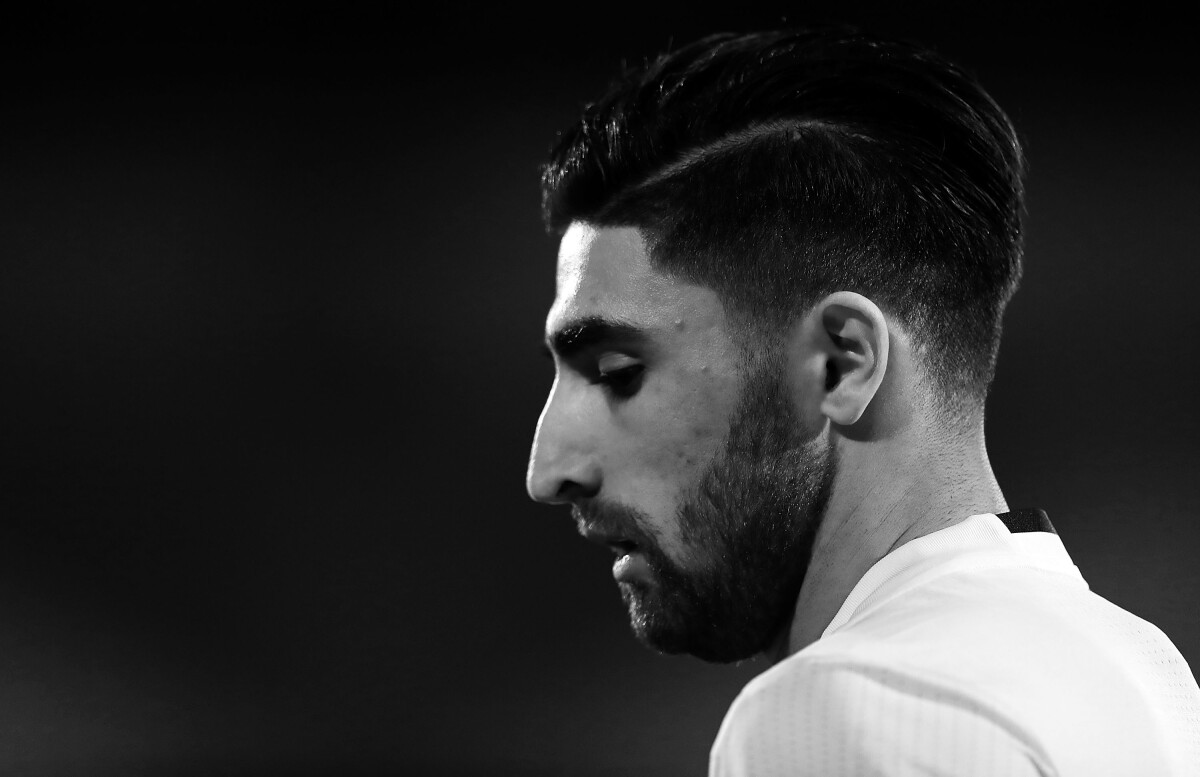
Thu, 28 Oct, 2021

Having finished last season as the top scorer in the Netherlands' Eredivisie, Alireza Jahanbakhsh is fast establishing himself as a star in Europe. The Islamic Republic of Iran star was part of a side that won many plaudits at the FIFA World Cup and he now has his eyes set of the AFC Asian Cup title.
Alireza Jahanbakhsh lives to play football. Born in Qazvin to the manager of a local bicycle factory and a stay-at-home mother, football was a shared love for the Jahanbakhsh family.
“I come from a really big football family; my uncles, my cousins, they really love football,” the 24-year-old revealed.
“One of the most amazing moments that I still remember is the qualification for 1998, I was five or six years old and the dramatic qualifying of Iran to the World Cup against Australia.
“The country was crazy; everyone was out [in the streets]. It was crazy and people were so happy. My parents, my father, who is crazy about football, and I still remember the people were cheering and dancing in the streets.”
www.the-afc.com/en/more/photo/jahanbakhsh_celebration_1.html
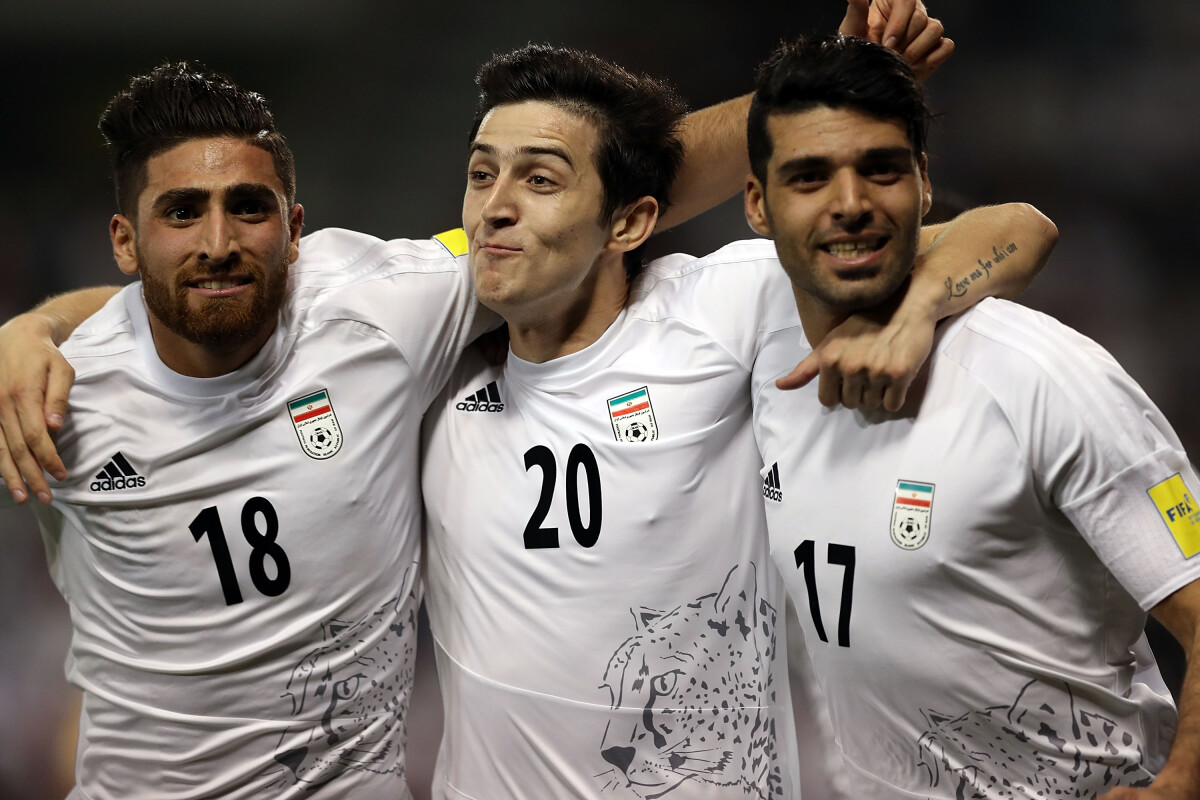
Thu, 28 Oct, 2021
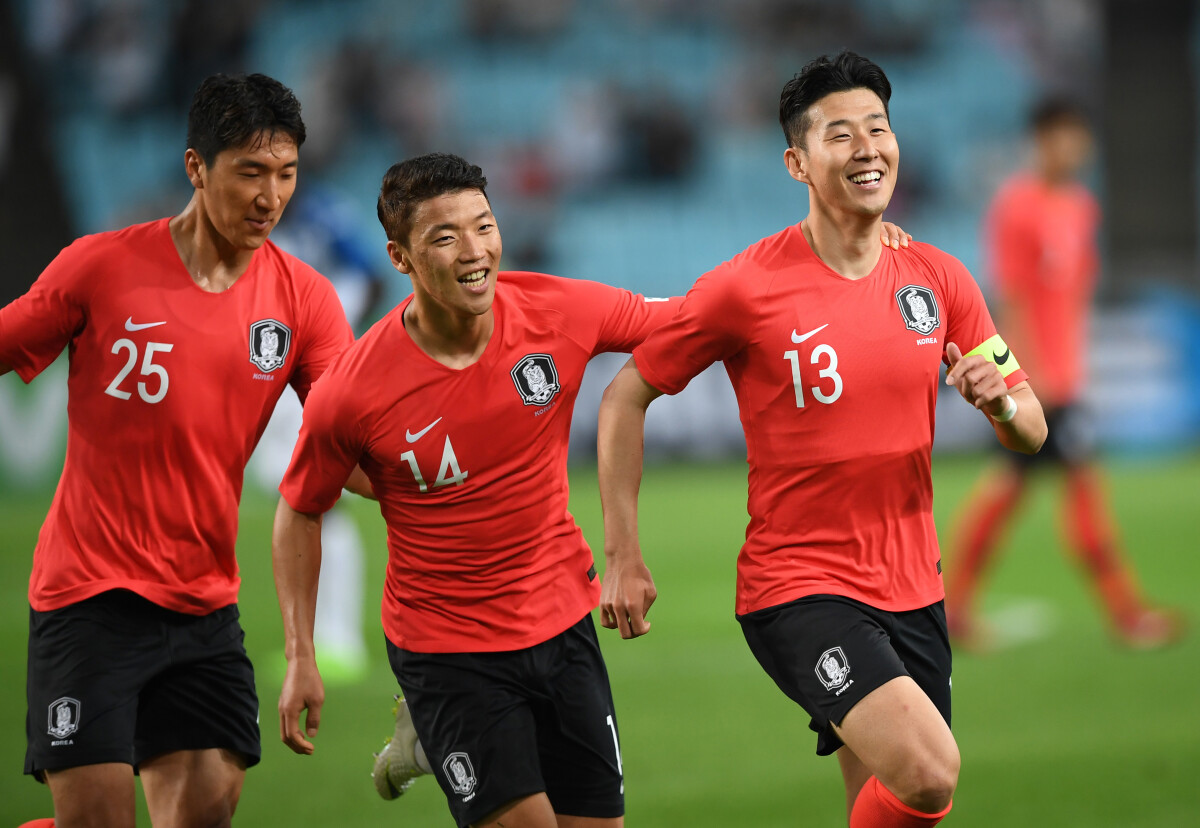
Kuala Lumpur: The five Asian nations at the 2018 FIFA World Cup concluded their participation with a record points tally. Five experts review their respective teams performances in Russia.
Our five-man panel had shared their pre-tournament thoughts on their countries’ chances and how they saw things potentially playing out. Now they reflect on those performances and look ahead to the 2019 AFC Asian Cup.
The Panel members are Sebastian Hasset from Australia, Pejman Rahbar from IR Iran, Etsuko Motokawa from Japan, Seo Ho-jung from Korea Republic and Atef Nahass from Saudi Arabia.
Thu, 28 Oct, 2021

After leaving Germany for the Philippines at the end of 2015, Kevin Ingreso’s career has gone from strength to strength, with the midfielder aiming for more AFC Cup success with Ceres Negros and set to make his AFC Asian Cup bow with the Philippines.
A nation was expecting ahead of the visit of Tajikistan in March. Having won two and drawn three of their five games in the third round of AFC Asian Cup UAE 2019 qualifiers, the Philippines stood on the verge of creating history ahead of their final Group F game against the Central Asians at Manila’s Rizal Memorial Stadium.
Unbeaten and two points clear of their opponents, and Yemen, at the top of the standings, their task was simple: avoid defeat and qualify for the competition for the first time. The achievement would cap a remarkable rise from ASEAN minnows to joining Asia’s elite at the continental competition.
The hosts had enjoyed the better of the first half but failed to make their advantage count; however, the game was turned on its head just after the hour.
After the Philippines had failed to clear a Tajikistan attack, Nuriddin Davronov burst into the box and was impeded by the tracking back Kevin Ingreso. The referee pointed to the spot and the crowd was stunned into silence. Akhtam Nazarov converted and the Southeast Asians’ hopes of qualifying were up in the air.
Thu, 28 Oct, 2021
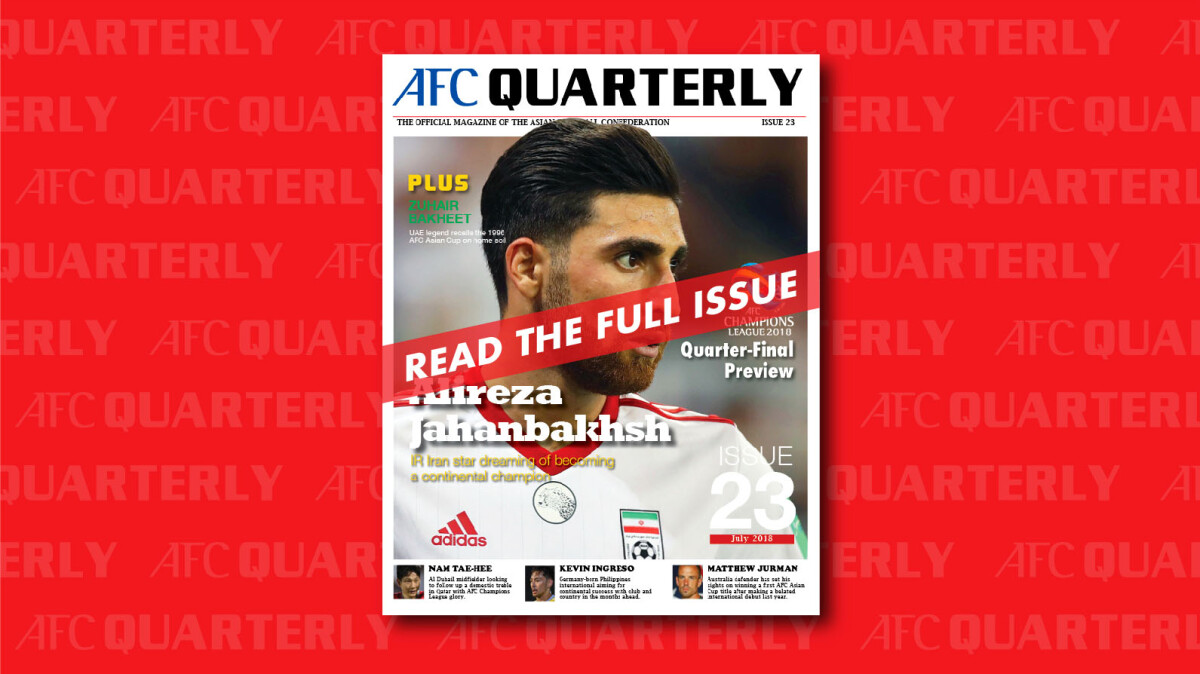
Issue 23
“The AFC Quarterly is the confederation's latest effort to reach out to the millions of passionate fans of Asian football and put on splendid display the game’s glorious achievements,” said AFC Acting President Zhang Jilong. “The biggest endeavour of this magazine is to make household names of our players and put the spotlight on our many competitions, which produce countless moments of top-notch football entertainment.”AFC Player of the Year Lee Keun-ho from Korea Republic is the cover star of the inaugural edition, which also features interviews with 2007 AFC Asian Cup winning striker Younus Mahmood, Olympic bronze medal-winning coach Hong Myung-bo, and Uzbek legend Mirdjalal Kasimov.
Thu, 28 Oct, 2021
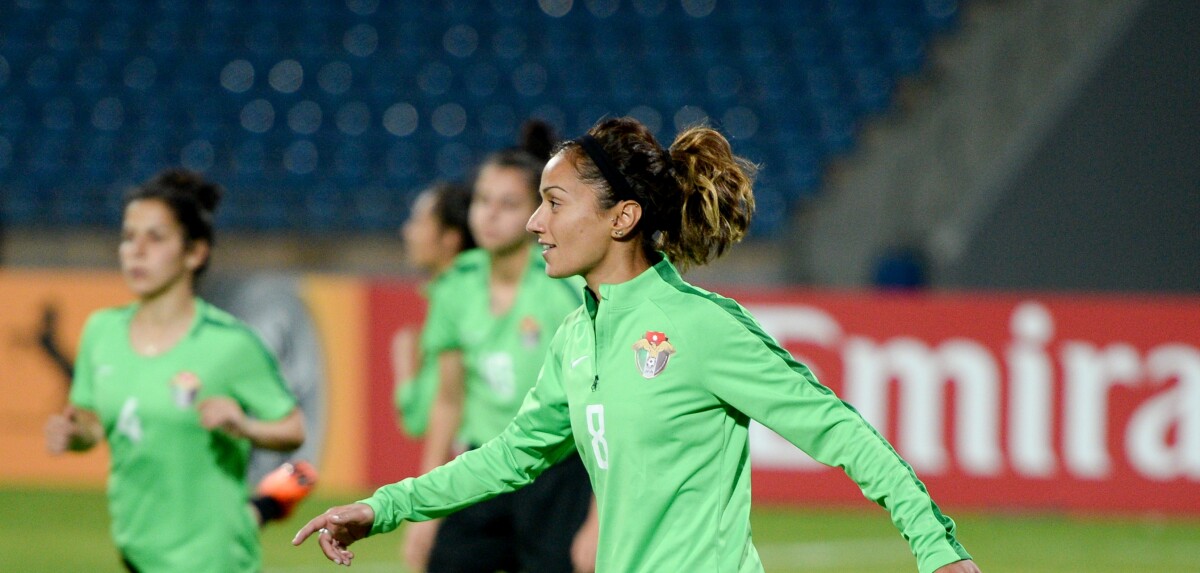
Stephanie Al Naber has come a long way since kicking a ball about the streets of Amman with her brother as the midfielder now skippers her country as Jordan becomes the first West Asian nation to host the AFC women’s Asian cup.
Four Jordanian players took up positions inside the opposition penalty area, tirelessly attempting to outsmart their markers to find that little bit of space that would allow them to convert the impending cross.
A two-woman wall lined-up to cover the tight angle as she took two steps back and prepared to take the free-kick. With everyone in the box awaiting her delivery from the right flank, Stephanie Al Naber had different plans, she always did.
The Jordan skipper took a quick look and rifled a curling strike past the wall, beating the Uzbek goalkeeper at her near post to send the home crowd into raptures.
With 15 minutes to go in the game, Al Naber’s goal, the third in an eventual 4-0 triumph, put the game beyond Uzbekistan, in the process sending Jordan to their first ever AFC Women’s Asian Cup in 2014.
Thinking differently has been a constant in Al Naber’s life. Defying the stereotypes, she played street football in Amman from an early age, often going head-to-head against her younger brother Youssef, now a Jordanian international midfielder who plies his trade at Shabab Al Ordon, one of the country’s leading clubs.
Becoming a footballer developed into an obsession for young Stephanie, and by age 17 she was part of the Shabab Al Ordon side that won the inaugural nationwide women’s football championship in Jordan.
The club has a special connection to the Al Naber family, as Stephanie’s younger sister Natasha also represents the team and their father, Mazen Al Naber, is a member of the its board of directors.
Al Naber reflects on that evening at Amman International Stadium when her goal helped realise the dream of an entire generation of women footballers in the country and establish Jordan as pioneers in women’s football in the region.
“I have been with the team for so long, but my favourite memory is that game against Uzbekistan,” remembers the now 30-year-old.
“A 4-0 win that night in front of our own fans led us to qualify for our first ever AFC Asian Cup in the 2014 edition in Vietnam.”
Pitted against hosts Vietnam, eventual champions Japan and runners-up Australia in Group A, Jordan had their work cut out in the finals and ultimately bowed out with three defeats, but it was a learning experience against sides with a much longer history in the women’s game than them.
Despite the frustration of the early exit, there was still a chance for a bit of history to be made as Maysa Jbarah registered the country’s maiden AFC Asian Cup goal in the opener against Vietnam and Al Naber left her mark with the team’s solitary goal in the 3-1 defeat to Australia.
Four years on from the Vietnam experience, Al Naber and her teammates are back on the continental stage, although this time Jordan did not have to contend with the roller-coaster ride of navigating the qualifying campaign.
Al Nashmiyat had automatically booked their place in the AFC Women’s Asian Cup Jordan 2018 as the host nation, and Al Naber’s pride of leading the national team players out onto the pitch on this big occasion on home soil is unparalleled.
“Being the captain of Jordan women’s national team is definitely an honour and privilege for me,” Al Naber says, “The feeling I get every time I put on the jersey with the flag on my chest and the band on my arm is a feeling I will never ever forget or get to experience anything closely as emotional.
“Let alone getting to do so in Jordan at an important tournament that can lead us to a childhood dream that I believed we can do from the start – to qualify to the FIFA Women’s World Cup in France in 2019.”
A childhood dream for Al Naber it may be, but the squad backed by the Jordan Football Association and the coaching staff are sparing no effort in making sure World Cup qualification becomes a reality.
Despite being the host nation, Jordan did play in the qualifiers, and with their place in the competition guaranteed, the matches offered Al Nashmiyat the chance to get some competitive action and prepare for what is to come.
They flexed their muscles against their Asian opponents, topping the qualifying Group A in style. Al Naber contributed nine goals as Jordan strolled to five wins out of five in the fixtures played in Tajikistan in April 2017. Teammate Jbarah was the only player to score more in the qualifiers, netting 13 times.
After consecutive 6-0 wins over Bahrain and the UAE, Jordan recorded double-digit victories against Iraq and the hosts Tajikistan. In the final game, they proved too strong for fellow qualifiers the Philippines, who were brushed aside 5-1. The Southeast Asians were drawn against Jordan again in Group A of the finals, alongside China PR and Thailand.
Having conquered their group, Al Nashmiyat then upped the stakes, going on a pre- tournament European trip that saw them spend ten days in Madrid, where they were tested against three Spanish top division sides.
Al Naber and co were up for the challenge, earning draws against Rayo Vallecano and Madrid CCF and only losing to Spain’s Primera Division leaders Atletico Madrid.
Results were not as good in Jordan’s subsequent Alanya Women’s Cup in Turkey, where they found themselves clashing with nations much higher in the FIFA Women’s World Rankings. Coach Michael Dickey’s team lost to Poland, Romania and Mexico, who all rank in FIFA’s top 40, and earned a 2-0 win against Latvia.
Challenging themselves against tough opponents is an approach Al Naber has been happy with as Jordan look to make their World Cup dreams come true.
“The main objective that we have been preparing for since April 2017 is to qualify to the World Cup,” she admits. “We have worked so hard to be ready for this tournament, we played really important games over the past year in our preparations which taught us exactly what we need to work on and improve to achieve our goals.”
Alongside experienced duo Al Naber and Jbarah, Jordan have in their ranks a number of young talents that can take them far in the 2018 AFC Women’s Asian Cup and for years to come. The captain is full of praise for her younger teammates.
“Salma Ghazal, our 18-year-old promising goalkeeper; Tasneem Abu Rob, our 17-year-old midfielder; and Rouzbahan Freij our 17-year-old defender [are stars of the future],” she points out.
“Both Tasneem and Rouzbahan have also represented Jordan at the U-17 FIFA Women’s World Cup, and that enriched their international experience and self-esteem as well.”
Finishing in the top five to reach the 2019 FIFA Women’s World Cup might be Jordan’s stated objective in the tournament they are hosting, but Al Naber has no qualms about setting the bar even higher for herself and her teammates, aiming towards a place in the AFC Women’s Asian Cup semi-finals and perhaps going even further.
“If we could reach the World Cup, that means we also have the possibility of finishing in the top four, and that takes us to a whole new level of ambitions. Who knows, maybe even winning the AFC Women’s Asian Cup.”
Coming top has always been a target Al Naber has eyed and worked for, and with that attitude she has come a long way from the days of kicking a ball about in the streets of Amman with the boys.
Her rapid development almost mirrored that of the women’s sport in Jordan. After all, as a teenager, Al Naber was a part of the very first women’s national team setup 13 years ago.
“Women’s football in Jordan has changed a lot since we started back in 2005,” reflects the veteran midfielder. “The support from the Jordan Football Association has increased, the game is more popular, the fan base is bigger, and of course the mentality of the society has changed positively towards women playing football in Jordan.
“That gave young girls the courage to join clubs and play football, which increased the number of players and made them commit to the game.”
The results of these efforts are evident today as Jordan is, for the second time in a row, the only West Asian country to be at the AFC Women’s Asian Cup. Although club football in the country continues to lag slightly behind, which is one reason that drove Al Naber to pursue playing her football in other leagues in the region.
Now back in Jordan after her career took her to represent clubs across West Asia, from the UAE to Lebanon, Al Naber offers her assessment of the progress of the sport in the area.
“Women’s football in the West Asia region started a bit late, where in other regions it was already popular and way ahead. West Asia is a conservative region and it took time for society to understand and accept the fact that women can also play football and there is nothing wrong with that.”
“We are getting there, but national associations need to start with girls at a young age with the right training programmes to get them ready physically and mentally to compete at a high level when they reach the senior teams,” she adds.
The Jordanian skipper always relished a challenge, and the biggest of all came in 2009, when she was approached by Danish Club Fortuna Hjorring, and without hesitation she took the challenge head on. Al Naber ended up spending one full season with the nine-time Danish champions and scoring six goals from midfield.
“It was one of the most interesting and exciting experiences I have ever had in my life,” recalls Al Naber, who played primarily as a left winger for the 2003 UEFA Women’s Cup finalists.
“It was a dream come true to play in Europe professionally and be able to live a life of a professional football player. I will not lie to you and say it was easy. No, it was the hardest thing I have ever experienced; living alone in a country where I knew no one, having to play with top players, top teams, and get to experience the UEFA Women’s Champions League.
Al Naber insists that she learnt a lot during her time at Fortuna Hjorring, benefitting from the higher level of training and stricter professional lifestyle. The one thing she could not cope with in Northern Europe was the cold, gloomy Scandinavian weather in addition to being away from her family and friends. Eventually, this was what prompted her to make the decision to return to Jordan after just one season.
Despite the brief spell in Denmark, Al Naber made history in becoming the first Jordanian and Arab female player to play football professionally in Europe. It is a legacy she is proud of and will continue to cherish.
“This experience added a lot to me personally and football-wise, I have learned so much from the players, coaching staff, and living by myself. It opened a lot of doors to my football career.”
Al Naber’s journey is one of determination, challenging the status quo and remaining defiant in the face of obstacles, no matter how difficult. And as one of Jordan’s greatest ever female athletes enters the latter years of her career, there is still one more mountain she is determined to climb.
“What I know for sure is that it is a once-in-a-lifetime chance and for me it is my last chance to qualify to the World Cup and experience it.”
Despite the ambition, she remains realistic in her assessment of the team’s chances of reaching the global event as Jordan also aim to become the first women’s team from West Asia to appear at a FIFA Women’s World Cup at senior level.
“I know the team will give 100 percent, but after all it is football and just as there is a chance that we will win and qualify, there is also a chance we could lose and not make it. So, I am keeping my fingers crossed, and working hard and we will leave the rest to God.
Thu, 28 Oct, 2021
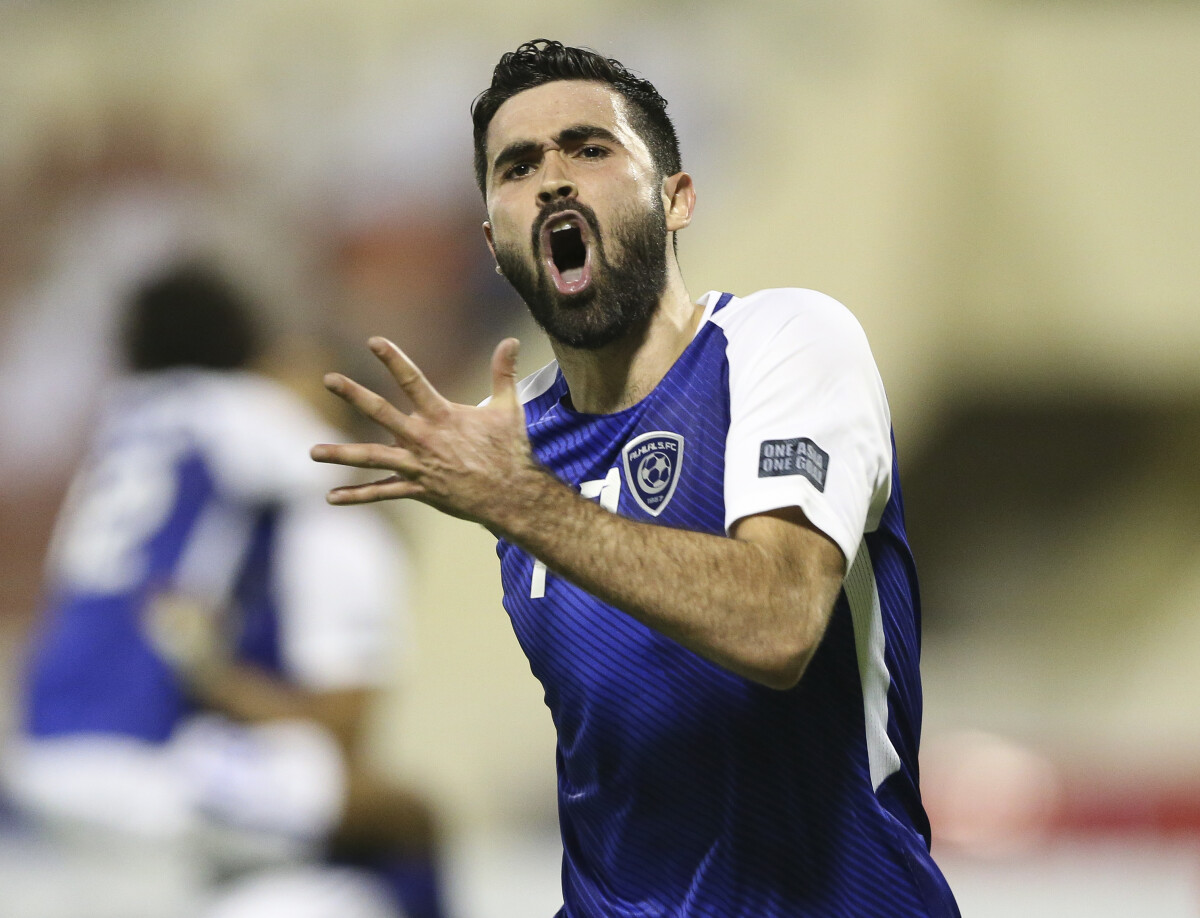
Omar Khribin began 2017 on loan at Al Hilal but after posting a season to remember for both club and country which culminated in the AFC Player of the Year and the AFC Champions League top scorer awards, the Syrian striker begins 2018 as one of the most talked about players on the continent.
A loan move to Saudi Arabian giants Al Hilal at the start of the year offered Omar Khribin the perfect platform to raise his game to a new level, but the ensuing 12 months saw him go above and beyond expectations.
Syria defied all odds to progress to the latter stages of FIFA World Cup qualifying, while Al Hilal would remain unbeaten on route to the AFC Champions League final. Khribin was instrumental for both.
“The most outstanding quality about Omar is his ambition,” commented Persepolis midfielder Bashar Resan, a close friend and former teammate of Khribin.
“He is always thinking about the future and working towards his dreams. His commitment and determination are impressive,” added Resan, who played alongside Khribin at Iraq’s Air Force Club.
Ambition and hard work were engrained in Khribin’s character since the early days of his childhood in Damascus. Watching his older brother Mohammed and the neighbourhood kids kick a ball about, he thought: “I will be good at this”. The past 12 months were indeed proof that young Omar grew up to be good at playing football.
Khribin came through the youth ranks at Damascus-based Al Wahda, where he started his journey at the age of nine. At 15, he made his first-team debut, becoming the youngest player in the club’s history. Such was his talent, being the youngest became a constant feature in his career.
Before his 19th birthday, Khribin was a member of the Syrian national team that won the 2012 WAFF (West Asian Football Federation) Championship in Kuwait, again the youngest player in Syria’s history.
As the security situation in Syria worsened, the striker joined many other Syrian players in seeking contracts abroad. His destination was Baghdad side Air Force Club, where he teamed up with would-be 2016 AFC Cup top scorer Hammadi Ahmed to form a terrifying attacking duo.
The Syrian finished his 20-game loan spell at Air Force Club with eight goals to his name, prompting fellow Iraqi side Al Minaa to sign him on another loan deal the following season. But Khribin’s final campaign in Iraq was cut short and he returned to Al Wahda.
Syrian coach Mohamed Quaid, who led Al Karama to the 2006 AFC Champions League final, would later spend time coaching in the Iraqi league, where he was impressed with his countryman Khribin.
UAE side Al Dhafra appointed Quaid for a third stint at the club in 2015 and one of his first requests was to acquire the services of Khribin.
“It is a stepping stone to bigger things,” said Khribin upon his unveiling at the Hamdan bin Zayed Stadium in early 2016. It would not be long before the prophecy was fulfilled.
One of the smallest teams in the UAE Pro League, Al Dhafra’s 5,000 capacity stadium is located in the small town of Madinat Zayed, a desert oil town with a population of under 30,000 people.
Not a place where many young footballers dream of plying their trade. Add an annual battle against relegation and the experience could prove a mountain too high for any young player, but Syria’s first million-dollar footballer faced the challenge head on.
The Al Dhafra board had splashed a club record US$1 million to make Khribin the most expensive Syrian player of all time. It would prove to be one of the best signings in the club’s history as he formed one of the UAE Pro League’s most lethal attack lines with Senegalese striker Makhete Diop.
“It is one of the strongest leagues in Asia, I will get more exposure here where I can play against top players like Omar Abdulrahman and Ali Mabkhout,” remarked Khribin after joining Al Dhafra in January 2016. Nearly two years later, he would pip Abdulrahman to the top individual prize in Asian football.
For now, Khribin set his eyes on the challenge of lifting the club from the danger zone and showcasing his talents for bigger sides who could be keeping an eye on the UAE league.
One year, 22 goals and a Fans’ Player of the Year award later, Khribin had not only helped Al Dhafra escape relegation, but also contributed to their highest ever league finish, ending the 2016/17 season in seventh place.
His task at Al Dhafra had been accomplished, and it was time to take the next step. One of many clubs impressed by the Syrian’s talents were Saudi giants Al Hilal.
The thought of playing at one of Asia’s most popular clubs appealed to Khribin. So, when the club from Riyadh called, he was ready to answer. A loan deal was in place and the King Fahd International Stadium became his new home for the next six months.
‘Impress to Stay’ was Khribin’s mission and motto for his loan stint in Riyadh, and impress he did. Two weeks after his arrival at the Saudi capital, the number 77 broke his Al Hilal duck and from there on there was no stopping him. Against arch-rivals Al Ittihad in March, he endeared himself to the fans by scoring the second goal in a 3-1 win.
A return to the UAE was on the agenda for Khribin as Al Hilal travelled to Abu Dhabi to face Al Wahda on Matchday Three of the 2017 AFC Champions League. The Emiratis had a 2-1 lead and a one-man advantage going into the final half an hour, when Khribin got on the end of a squared pass, rounded the goalkeeper and claimed his first of many AFC Champions League goals.
Syria had already surprised many by reaching the decisive third round of the 2018 FIFA World Cup qualifiers. The ‘Qasioun Eagles’ grabbed the headlines early on by winning in China before drawing with Korea Republic in the Syrians’ adopted home of Malaysia, where they were to face Uzbekistan in March.
The match had looked destined for a draw but Khribin stepped up to confidently convert an added-time penalty to put Syria back in contention for qualification spots.
Khribin then went into his first Riyadh derby in the final week of the season. Al Hilal had already wrapped up the league title as they welcomed Al Nassr with one thing on their mind: to show their city rivals who the boss is. A defeat here would blemish an otherwise perfect league campaign.
Always one to relish a challenge, Khribin was at his lethal best as Al Hilal turned the style on, putting five past their visitors. The Syrian made his mark on the derby records with a memorable hat-trick. A diving header in the first half was followed by a threeminute double salvo after the break to sign off his first league season in style.
Just a few days after that impressive derby performance, Al Hilal were back in AFC Champions League. Having already secured their passage to the knockout stage, Khribin netted a brace, including the winning goal, in their final group game against Qatar’s Al Rayyan as the Saudi side secured an entertaining 4-3 victory to top the standings.
Al Hilal took a 2-1 away lead into the second leg of the last 16 against the Islamic Republic of Iran’s Esteghlal Khouzestan, but within the first ten minutes their advantage had been cancelled out.
Five minutes later Khribin levelled the score on the night with a diving header and his fourth of the tournament as Al Hilal eventually advanced to the last eight following a 4-2 aggregate win, before the Riyadh club saw off the United Arab Emirates’ Al Ain in the quarter-finals.
Back on international duty, the striker ran the show against Qatar in the penultimate game of the third round of qualifiers as a goal either side of half time propelled his national team to a 3-1 victory, confirming their status as genuine contenders for the top positions in the group.
Syria then booked their place in the twolegged play-off against Australia with a lastminute draw against Iran.
A 1-1 draw in the first leg in Melaka set up a thrilling tie in the return leg in Sydney, but Khribin would miss out on the clash having picked up a yellow card.
There was heartbreak for Syria, though, as an extra-time Tim Cahill goal settled the affair for the Socceroos, but Khribin ended the qualifying campaign on ten goals. Only four players scored more.
Khribin’s performances over the year convinced Al Hilal to splash out US$5 million to make his loan deal permanent. And the Syrian would raise the level of his performances to even greater heights in the weeks to come in the AFC Champions League semi-final against Iran’s Persepolis.
The thermometer was finally dipping below 40 degrees in Abu Dhabi, a sign that the long, hot summer was finally giving way to a marginally cooler autumn.
Tension was in the air at Mohamed bin Zayed Stadium in the late September evening as Al Hilal players sat in the dugout preparing for their final training session ahead of the big game in the first leg against the Tehran side.
Players chatted away by the touchline, tying their laces or taking sips of water. A few seconds later, he emerged from the tunnel nonchalantly juggling a ball as he walked onto the pitch, unbothered by the weight of expectation.
The two semi-final clashes against Persepolis would see the Syrian produce some of the finest individual performances witnessed in the 2017 campaign.
In the first leg, Khribin started with a well-placed header, then added two more goals in the second half to complete a ‘perfect hat-trick’: a header and a goal with each foot to hand Al Hilal a 4-0 winning margin that all but sealed their place in the continental final.
The two sides faced off again three weeks later in Muscat. Persepolis scored early, but Khribin calmed the Al Hilal faithful’s nerves with a coolly taken ‘Panenka’ penalty kick.
Persepolis took the lead again, before the number 77 added a fifth goal against the Iranians over the two legs to end the semifinal stage on nine goals, level with Shanghai SIPG’s Hulk at the top of the competition’s scoring charts.
The Saudis set up an AFC Champions League final showdown with Japan’s Urawa Red Diamonds as they looked to erase the ghosts of their 2014 final defeat to Western Sydney Wanderers.
Al Hilal fell behind to an early goal in the first leg at King Fahd International Stadium but Khribin clawed his team back into the game by restoring parity with a goal that would ultimately see him pick up the AFC Champions League top scorer award.
Unfortunately for Khribin, his high-scoring campaign ended on a negative note as a 1-1 home draw set up a difficult task in the second leg in Japan. With the match still goalless at the hour-mark, Khribin was stretchered off with an injury and Rafael Silva compounded Al Hilal’s misery with a late strike as The Blues suffered a second defeat in the final in four years.
Had you asked any Al Hilal fan what they made of Khribin’s transfer fee after his derby exploits back in May, you would have got the same answer every single time: “Worth every penny”.
Seven months on from that night in Riyadh, ask any ‘Hilali’ the same question and the answer would be: “It was undoubtedly a bargain”.
“It is a stepping stone to bigger things,” Khribin’s statement from 20 months ago rings loud and clear as he embraced Omar Abdulrahman, who he succeeded as the AFC Player of the Year, at the AFC Annual Awards gala in Bangkok in November.
“I apologise to the fans I could not make happy, we will do better in the future,” said Khribin upon picking up his award. The striker, having checked the most prestigious individual award off the list, remains determined to achieve collective glory.
“With the club and the national team, we did our best, but it was not meant for us to win the Champions League title and qualify for the World Cup finals. We hope that next year we can do better.”
One of Khribin’s next aims will be to help Syria do well in the UAE as they play in their sixth AFC Asian Cup in early 2019.
“We will try to do our best for the Syrian national team. We play and fight to bring happiness to our people. That is our main target.
“We have determination in matches, but the determination is stronger when you have people who are hungry for the happiness and joy. Our people deserve to be happy.”
Thu, 28 Oct, 2021
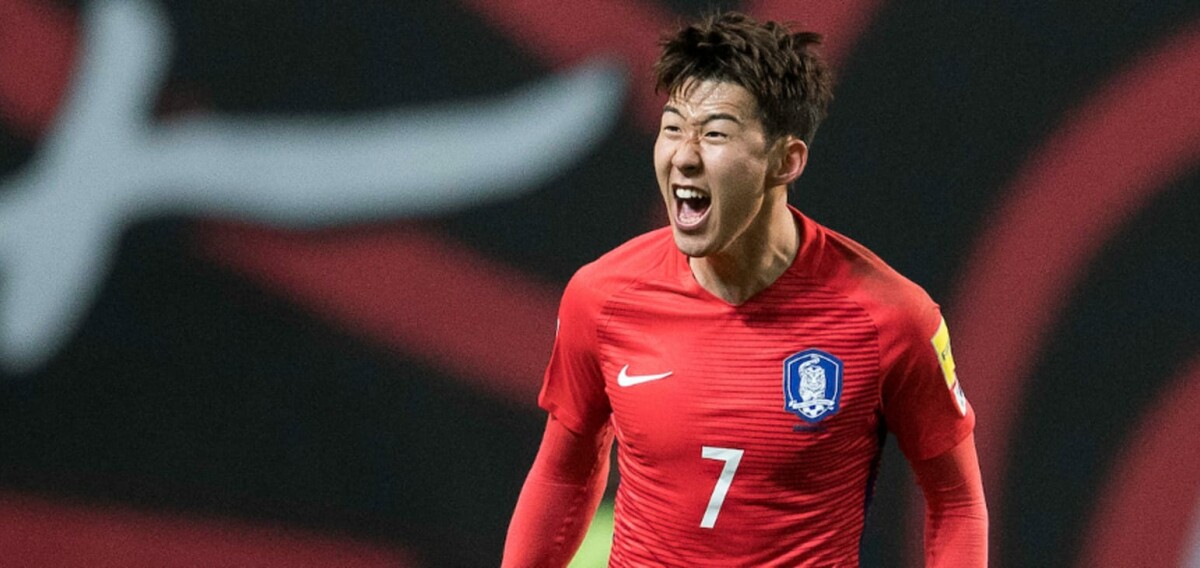
After a record-breaking 2016-17 in England’s Premier League, Asia’s most expensive player Son Heung-min helped Korea Republic qualify for their ninth successive FIFA World Cup. He now has set his sights on becoming a hero for the East Asian nation.
Around 40 minutes’ drive from the hustle and bustle of downtown Seoul lies Paju National Football Center, a modest training complex situated amid tranquil, leafy surroundings where Korea Republic undergo their preparations for home games.
Adjacent to the main pitch, the players congregate inside a building which, at first glance, doesn’t appear particularly striking. However, its most significant feature – a wall decked out with team photos of theTaeguk Warriors sides that have qualified for the FIFA World Cup over the years – offers a strong reminder to the current generation of what is expected of them.
Korea Republic have appeared at nine tournaments in total, the first being in 1954, and have advanced to every one since 1986. It is an impressive record that is unrivalled in Asia.
Cha Bum-kun, Hong Myung-bo and Park Ji-sung are just three of the legends that appear in the various team lineups, the latter two being part of the most successful Korea Republic side ever after reaching the World Cup semi-finals on home soil in 2002. It is they who the current team would so dearly like to emulate.
The most recent picture, from 2014, features the nation’s biggest hope, Son Heung-min, who, at 21, was the youngest player in the Korea Republic squad in Brazil. Then at Germany’s Bayer Leverkusen, the forward played in all three of his country’s games, scoring against Algeria, but the East Asians were eliminated after picking up just a solitary point.
In truth it was a disappointing World Cup given that four years earlier, in South Africa, the national side had reached the knockout stage for the first time outside their own country.
But for Son, who had left his homeland to join Hamburg’s youth academy at just 16 years of age in 2008, it was another huge step in his development after having already appeared in the UEFA Champions League earlier in the season.
“I think [the benefits of moving abroad at a young age] is a very important issue,” said Son, sat in front of the ‘Wall of Fame’ following a training session ahead of August’s FIFA World Cup qualifier with the Islamic Republic of Iran.
“In 2014, I was the youngest player and I already had experience before the World Cup by playing in the [UEFA] Champions League. So I think it was very important for me to play in Europe and learn before the big competitions.
“Playing in leagues such as the English Premier League, the German Bundesliga or Ligue 1 in France can give you good experience for these tournaments.”
Experience is something Son already has in abundance, after leaving all he knew behind and heading to Europe in his teenage years. At 19, he was named in Korea Republic’s squad for the 2011 AFC Asian Cup in Qatar, where he scored his first goal for the East Asians in a 4-1 group stage win over India.
The Taeguk Warriors would ultimately lose on penalties to eventual winners Japan in the semi-finals, but for Son it was the start of an international career that has already yielded nearly 60 caps and 17 goals.
Impressive performances after breaking into the Hamburg first team as a teenager, meanwhile, convinced Bayer Leverkusen to break their transfer record in 2013 by luring the forward to western Germany.
Son helped his new side reach the UEFA Champions League knockout phase in consecutive seasons, scoring in wins over Benfica and Zenit Saint Petersburg in 2014, as the Chuncheon native fitted seamlessly into the Leverkusen lineup.
Heartbreak for the national team followed at the beginning of 2015 when, after the forward scored an injury-time equaliser against hosts Australia in the AFC Asian Cup final, the Socceroos ran out 2-1 winners in extra time to mean Korea Republic’s long wait for the continental title – which stretches back to 1960 – continued.
But Son’s growing reputation had attracted the attention of Tottenham Hotspur who, already boasting a side brimming with young talent, parted with 30 million euros to bring him to north London.
Now 23, Son became the second Korean to represent Spurs – after Lee Young-pyo – but, more significantly, had just been made the most expensive Asian player in history. With the global spotlight now on the forward more than ever, would the pressure of the price tag affect him like it had so many that had gone before?
“No, no, [the pressure] is something I enjoy,” insisted Son.
“You maybe change [teams] two or three times in your career so it’s good to have a record like this. I can tell people in 20 or 30 years’ time that I moved from Bayer Leverkusen to Tottenham for 30 million euros – I can say this once I’ve finished my career.
“I played in Germany for a long time, five years professionally, so I think the timing of the move to Tottenham was fantastic and I think I have made big steps forward.”
The faster pace of life in the English Premier League offered Son new challenges, while the Korean international also had injuries to contend with during a first season in which, although was far from disappointing, he was unable to produce his best form.
“There are many differences,” he admitted. “In England it’s more physical and the teams play much more attacking football.
“It’s quicker, whereas in Germany it’s more tactical and it’s not like every attack has to end in a goal, sometimes you can wait and just keep possession.
“In the first year I didn’t show my best performances because of the injury, but in the second year I showed how good I am and how much I enjoy the Premier League.”
That is no understatement. Often deployed in an exciting attacking quartet that included Harry Kane, Dele Alli and Christian Eriksen, Son excelled in a team that finished as runners-up in the league. On a personal level, records continued to tumble.
In September 2016, the forward became the first Asian to win the Premier League’s Player of the Month award, before claiming it again in April to become the only player to take the prize more than once in the season.
Perhaps more significantly, though, was the fact that Son managed to break Cha Bum-kun’s 31-year record of the most goals scored by a Korean player in a European top-flight league.
Arguably Korea Republic’s greatest-ever player, Cha netted 19 times for Bayer Leverkusen in the 1985-86 season, but Son was to exceed that total by finishing on 21 goals in all competitions.
“I was a bit nervous when I was on 19 goals, the same number as Cha Bum-kun, because I wanted to break the record,” admitted Son.
“Then as soon as I scored the two goals against Leicester it was a big relief and I was really, really happy because this was more than 30 years ago.
“I can admit that I was proud of myself because to make history is not an easy thing to do. It was always my dream to get more goals [than Cha] and every season I want to have a better season than my last one.”
It took just a few weeks of the current campaign for Son to get off the mark once more, when he scored the opener in Tottenham’s 3-1 UEFA Champions League victory over German giants Borussia Dortmund – a side he regularly found the back of the net against during his time in Germany.
Lavish off-season spending by other teams in the English league is expected to see the country’s richest clubs put in a strong challenge for the title this year, while Spurs also must contend with adapting to a temporary new home, Wembley, while work on their new stadium is being completed.
But, although the current campaign promises to be even tougher than Son’s first two in London, the forward remains upbeat about the team’s prospects
“It’s a great team, we’re young and everyone is hungry,” said the forward.
“Everyone has good quality and I enjoy going to training with them every day. I learn things from them and they learn things from me.
“Last season the team was really great. We came so close to winning the title. I enjoyed it as well, every game we went on the pitch to show how good we are and how good I am. I enjoyed last season really much.
“This makes me really happy and this is what I wanted when I moved to Tottenham. I wanted to make one or two more big steps and I’m on the way to making it.”
Back on the international scene, there is only one man the Korea Republic fans will look towards to fire them beyond the group stage for a third time come the end of the season, after, with some difficulty, the Taeguk Warriors did secure a ninth successive appearance at the tournament.
After enduring an inconsistent qualifying campaign, German coach Uli Stielike was relieved of his duties and replaced by former Korean international Shin Tae-yong for their final two matches.
The East Asians would draw their penultimate game with Iran to leave their qualification hopes hanging in the balance ahead of their final-day meeting with Uzbekistan in Tashkent, where only a win would guarantee progression.
Son struck the post in the first half of a game that saw the Koreans hit the woodwork three times before it ultimately also finished goalless. However, with Syria playing out a 2-2 draw with Iran, the point was enough to see Korea join the Iranians, Japan and Saudi Arabia as the four confirmed Asian teams for Russia next year.
“Qualifying nine times in a row can give us confidence because that is not an easy thing to do,” reflected Son after the game in Tashkent.
“We are happy because we have qualified but now we must look forward. Next year is very important, it is the World Cup so we have to work really hard with the new manager to see what happens.”
Despite playing his entire senior career outside his native Korea Republic, it is clear home is where the heart is for Son, and the ambition to drive the team forward over the coming months is evident.
It was more relief than joy etched on his face following the point in Uzbekistan and there is little doubt there is plenty work to be done ahead of the FIFA World Cup.
Not least will be rectifying a poor away record that saw three defeats and two draws from five games over a campaign in which progression was almost entirely down to a near perfect home record.
“I think we maybe feel the pressure more when we go away from home and we don’t play with the same confidence,” explained Son, who missed the away defeat to China and the scoreless stalemate with Syria in Malaysia.
“Maybe we’re a bit scared, we try but we’re not at 100 percent.”
Unfazed by being the most expensive Asian player in history and with a record-breaking season already behind him, fear is not a word that can be used to describe Son.
Indeed, having achieved so much by such a young age, it is hardly surprising that he sets the bar high when it comes to his personal aims with the national team.
“I want to be a hero in South Korea, of course this is my dream,” admitted Son.
“I want to be known as someone who helps his teammates, the game-changer. I hope I can make big steps and I’m looking forward to a positive future.
“It’s not easy leaving South Korea at 16 to go to Germany. Of course, I’m still young and I want to learn more – every game, every day. This is my goal and I want to see where I can get to when I’m 27, 30, 35.”
Having successfully navigated the Road to Russia, Shin will surely use the months ahead to work on improving a side that laboured to qualification yet still boasts plenty of talent within its ranks.
Son may be the biggest star, but Germany-based Koo Ja-cheol and captain Ki Sung-yueng, who plies his trade with Swansea City in the English Premier League, offer experience and quality in the centre of the park.
Young attacking players such as Hwang Hee-chan and Kwon Chang-hoon – based in Austria and France respectively – provide enthusiasm and dynamism up front, and will aim to develop further over the course of the season.
The squad, rightly, cannot yet be compared to the ‘Class of 2002’, but, due to the globalisation of the game, already has far more international experience than the team that started the World Cup 15 years ago.
Should they find the right balance in time for the next summer’s competition, then Son may well hear his name mentioned in the same breath as the legends that evoke so many fond memories in Korean football – and realise his dream of being a hero in his homeland.